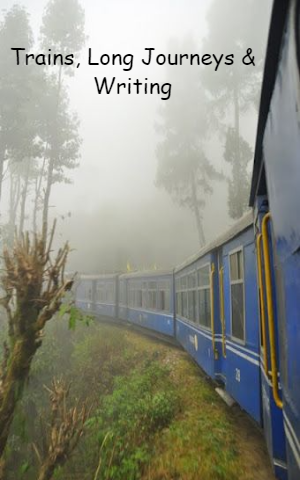Trains, Long Journeys and Writing
Trains, Long Journeys and Writing


I am on a train, heading towards the upper northeast corner of India, Assam. A friend of mine, Pragya, has invited me to her hometown Duliajan.
Dibrugarh Rajdhani (from New Delhi to Dibrugarh, Assam) is one of the longest, most beautiful and most tiring train journeys in India. 39 hours in total, the train cuts across the chest of India through the Indo-Gangetic Plains, snaking through the tiny neck of a landmass at New Jalpaiguri that joins India with the North East to arrive at the upper end of Assam at the terminal station of Dibrugarh. Fortunately, I didn’t have to take the entire journey. I boarded from Patna at 2 o clock in the night, 26 hours before I reach Tinsukia. Tinsukia is the nearest railway station from Duliajan and Pragya is coming to pick me up tomorrow morning.
Duliajan is an industrial town, about 50 kilometers from Dibrugarh. Famous for being the headquarters of Oil India Limited, the sleepy town is relatively aloof from the rest of the country. With no airports or train stations, jeeps, and trekkers as the primary mode of transport, the town is primarily populated by those employed by Oil India Limited. Pragya’s father is a senior engineer there, about to retire in a couple of years.
As I sit on the side-lower berth writing this letter, partaking in the running landscape, sipping the bland tomato soup, I reflect on the past 18 hours spent on the train. The weariness hasn’t seeped in yet, as the train let me feel at home, allowing me to practice my everyday rituals. Yoga in the morning, sunbathing pre-noon, an afternoon nap, and an evening walk, lunching on the simple home-like food, besides reading and writing. The morning sun as the train cut through the misty Bengal woke me up at 6, chai followed at 6.30 am along with Marie biscuits, just like I had with grandmother, and I immersed myself in reading Paul Theroux’s masterpiece The Great Railway Bazaar.
In 1973-74, Theroux traveled (mostly) by train from London to Tokyo via India and South-east Asia, before returning on the Trans-Siberian Express to his point of origin and chronicled his journey in the book. I couldn’t have summed up the experience of trains better than Theroux, so I’m quoting him: “The romance associated with the sleeping car derives from its extreme privacy, combining the best features of a cupboard with forwarding movement. Whatever drama is being enacted in this moving bedroom is heightened by the landscape passing the window: a swell of hills, the surprise of mountains, the loud metal bridge, or the melancholy sight of people standing under yellow lamps. And the notion of travel as a continuous vision, a grand tour’s succession of memorable images across a curved earth — with none of the distorting emptiness of air or sea — is possible only on a train. A train is a vehicle that allows residence: dinner in the diner, nothing could be finer.”
The more I read Theroux, the more I sensed the train breathing, heaving like a living being and the more I reminisced about the numerous train journeys I took in the past. The thrill of the solo train journey to Delhi in the December of 2007 to return to my college, the first one I took alone. The cramped general compartment of the Mumbai-Ahmedabad Express was undertaken when I was penniless, but had an important meeting to attend. I stood for four hours until Surat, inhaling the armpits and farts of the fellow passengers. The bullet train that I boarded from Hangzhou to Shanghai in China, 500 kilometers covered in less than 1.5 hours, the landscape running past like disco-lights. Or the TGV in France, from Paris to Toulouse, which was so bicycle friendly that I took my bicycle along.
Before my network goes as the train enters Assam from Bengal, I part with a quick quote: “Tourists don't know where they’ve been, travelers don’t know where they’re going.” - Paul Theroux
.






















































